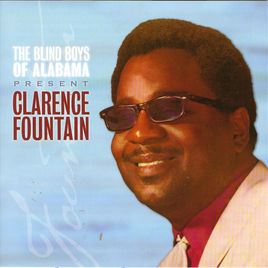Gospel Legend Clarence Fountain Passes

Clarence Fountain, one of the original members of the iconic 5 time Grammy winning Gospel group the Five Blind Boys Of Alabama made his transition on Sunday, June 3. Fountain was 88.
The Blind Boys were permanent fixtures on stages and in concert halls across the country during the Golden age of Gospel music when quartets such as the Swan Silvertones, Dixie Hummingbirds and others dominated the genre.
The group experienced a resurgence in the 80s when they joined the touring company of the Gospel at Colonus. The group was nominated for 10 Grammy Awards, winning their first in 2001 for the album Spirit of the Century. Fred Hammond featured Fountain on his 1991 solo album debut I Am Persuaded singing I Came to Jesus (as I was).
News of Fountain’s passing was posted via a statement on the Blindboys.com website:
Clarence Fountain, founding member and longtime leader of the iconic gospel group Blind Boys of Alabama died this morning in Baton Rouge, Louisiana. He was 88.
With Fountain at the helm, the Blind Boys rose from humble beginnings to the pinnacles of musical achievement – winning multiple Grammy Awards, a Grammy Lifetime Achievement Award and an NEA National Heritage Fellowship, as well as being inducted into the Gospel Music Hall of Fame and performing at the White House.
Born in Tyler, Alabama on November 28, 1929, Clarence Fountain grew up in a churchgoing and musical family in Selma. At age eight he was enrolled at the Alabama Institute for the Negro Deaf and Blind in Talladega. There he joined a large boys choir. Inspired by weekly radio broadcasts of the Golden Gate Quartet, he and five friends decided to start their own singing group. Calling themselves the Happy Land Jubilee Singers, they snuck off the school campus to perform a cappella for soldiers at a nearby military training camp. Buoyed by the praise (and money) they received, the group left the school in 1944 while still in their teens.
Early on, the Blind Boys emulated the jubilee harmony style of gospel singing, but eventually became forerunners of the ‘hard’ gospel sound. This style featured a shouting and preaching lead singer (usually Fountain), accompanied by fuller instrumentation. The band became known as “house-wreckers,” a term that referred to their ability to rouse a church audience into states of spiritual ecstasy. Fountain said, “You have to feel the spirit deep in your gut, and you have to know how to make someone else feel it.”
By the late 1940s the Blind Boys were touring full-time, performing for segregated audiences in churches and schools. Under Fountain’s direction, the Blind Boys had their first hit recording in 1948 on the Vee-Jay label with the song “I Can See Everybody’s Mother But Mine.” At a concert in Newark, New Jersey that year the band, still known as the Happy Land Jubilee Singers, performed on the same bill as another group of blind singers, the Jackson Harmoneers. Clever promotion billed the event as a battle between the Five Blind Boys of Alabama and the Five Blind Boys of Mississippi. As Fountain told it, “The crowd loved us, the name stuck, and things took off for us.”
A series of legendary concerts with the two bands concluded with singing competition between Fountain and the lead singer of the Mississippi group, Archie Brownlee. According to Fountain, “Suddenly we were hot stuff, playing for audiences of 1,000 or more. We were on the upswing, and Ray Charles’s manager offered us a big deal to go on tour performing rock, soul, pop – everything, really, but gospel…I was head of the Blind Boys, I was the lead singer. And there was no way we were going to go pop or rock. Who needed it? Our bellies were full, we had no headaches, we were happy. At least I was happy, singing real gospel.”
In 1953, the Blind Boys began a successful five-year association with Specialty Records in Los Angeles, but ultimately left the label because of renewed pressure to cross over to secular music as gospel star Sam Cooke had done. According to Fountain, “I was in the studio with Sam Cooke when he signed his contract. The man offered me one just like he did Sam, but I turned it down because that ain’t what I told the Lord I wanted to do. It’s what I promised Him. When you promise God something, you don’t go back on that.”
In the early 1960s, the band sang at benefits for Dr. Martin Luther King, Jr., and was a part of the soundtrack to the Civil Rights movement. But as the years passed, gospel fans started to drift away and follow the many singers who had originated in the church but were now recording secular music. However, the Blind Boys continued to perform their hard-driving traditional gospel sound, touring around the United States and abroad.
In 1983, they received national acclaim for their performance in the Off-Broadway stage production of Gospel at Colonus, a contemporary musical adaptation of the Greek traged Oedipus at Colonus by Sophocles set in a black Pentecostal church. Morgan Freeman played the young Oedipus, and the Blind Boys, with Clarence in the lead, sang the role of the blinded Oedipus. The play, which eventually ran on Broadway and toured the country, was lauded as a landmark in American musical theater, receiving two OBIE Awards and nominations for a Pulitzer Prize and a Tony Award.
The 1990s saw the beginning of a creative rebirth for the band. In 1992, the group received its first Grammy nomination for the album ‘Deep River,’ produced by Booker T. Jones. The Blind Boys take on Bob Dylan’s “I Believe in You” on that album set the stage for more covers of mainstream songs.
As the new century dawned, the Blind Boys signed with Peter Gabriel’s Real World Record and the label’s initial release, “Spirit of the Century,” won the band their first Grammy Award for Best Traditional Gospel Album in 2001. They won consecutive Grammys in each of the next three years with “Higher Ground” in 2002, “Go Tell It on the Mountain” in 2003 and “There Will Be a Light” (a collaboration with Ben Harper) in 2004. In 2009, the band was recognized with a Grammy Lifetime Achievement Award. Fountain and the Blind Boys recorded with an astounding array of artists, including Lou Reed, Bonnie Raitt, Tom Waits, k.d.lang, Justin Vernon of Bon Iver, Susan Tedeschi, Aaron Neville and Mavis Staples.
Due to declining health brought on by complications of diabetes, Fountain stopped touring with the band in 2007 but continued to record with them when able. In 2017, Fountain sang on the Blind Boys’ latest album, “Almost Home.” That album grew out of the recognition that the band’s original lineup was down to just two remaining survivors: long-time group leader Fountain and current leader Jimmy Carter.
“These men were both raised as blind, African American males in the Deep South during the Jim Crow years, and they were sent to a school where the expectation for them was to one day make brooms or mops for a living,” said Blind Boys manager Charles Driebe. “But they transcended all that. The arc of their lives and of the band reflects the arc of a lot of changes in American society, and we wanted to find a way to capture their experiences in songs.”
A wide-ranging interview with Fountain was recorded at his home in Baton Rouge, and then distilled into a 30-minute video and shared with a variety of songwriters who were invited to channel Fountain’s words and reminiscences into song. The album opener, the captivating “Stay On The Gospel Side,” trace Fountain’s roots all the way back to childhood and recounts his insistence on remaining true to his gospel origins. Fountain was credited as one of the writers of the song, since the title came from his exact words. According to Fountain, “My theory is do something good in the end and that will close out your longevity. After that, you can go on home and sit down.”
Fountain is survived by his wife, Barbara.



NO COMMENTS